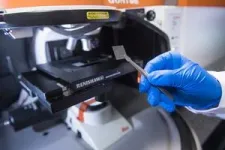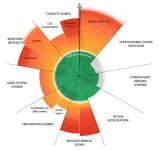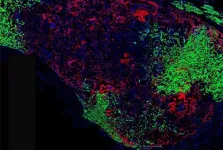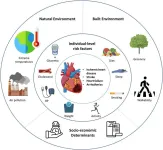(Press-News.org) In a survey of cat owners, those who fed their cats vegan diets tended to report better health outcomes for their pets than those who provided meat-based diets, though the differences were not statistically significant. Andrew Knight of the University of Winchester, UK, and colleagues present these findings in the open-access journal PLOS ONE on September 13.
Many pet foods contain cooked meat as the primary protein source, but a growing number of available products use alternative protein sources, such as plants or fungi. Some veterinary professionals have voiced concerns that vegan diets—which lack meat, eggs, and dairy—are less healthy for cats than meat-based diets. However, limited research has examined these concerns.
To help clarify the healthfulness of vegan cat diets, Knight and colleagues analyzed survey responses from 1,369 cat owners who were asked to report about a single cat in their household that had been fed either a vegan or meat-based diet for at least one year. The survey asked participants several questions regarding the cat’s health, followed by questions about its diet. About 9 percent of participants reported feeding their cat a vegan diet, and the rest a meat-based diet.
After statistically accounting for other factors that could influence health—such as a cat’s age or whether it is neutered—the researchers found that participants reported that vegan diets were associated with a lower risk of several health indicators, although none of the differences were statistically significant. For instance, compared to owners of cats on meat-based diets, owners of cats on vegan diets tended to report fewer veterinary visits, less medication use, and that their veterinarian would be more likely describe their cat as being healthier. After analysis, there was no statistically significant difference between the reported health indicators of cats on vegan diets and those on meat-based diets.
The survey also asked about 22 specific health disorders; 42 percent of owners of cats on meat-based diets reported at least one disorder, compared to 37 percent of owners of cats on vegan diets.
The researchers say their findings support the healthfulness of vegan diets for cats. They note, however, that they did not analyze the nutrient content of the cats’ diets.
#####
In your coverage please use this URL to provide access to the freely available article in PLOS ONE: https://journals.plos.org/plosone/article?id=10.1371/journal.pone.0284132
Citation: Knight A, Bauer A, Brown H (2023) Vegan versus meat-based cat food: Guardian-reported health outcomes in 1,369 cats, after controlling for feline demographic factors. PLoS ONE 18(9): e0284132. https://doi.org/10.1371/journal.pone.0284132
Author Countries: UK, Australia, Germany
Funding: This research and its publication open access was funded by food awareness organisation ProVeg International (https://proveg.com). AK received this award ID: Oct2019- 0000000286. However, this funder played no role in study conceptualisation, design, data collection and analysis, preparation of the resultant manuscript nor decisions relating to publication. We are grateful for their financial support.
END
Owners of cats on vegan diets report healthier pets than owners of meat-eating cats
Health outcome differences, while not statistically significant, may help address concerns that vegan diets are worse for cats’ health
2023-09-13
ELSE PRESS RELEASES FROM THIS DATE:
Wolves and dogs appear to remember where people hid food
2023-09-13
In a study involving several wolves and dogs, both animals performed better at finding hidden food if they had observed the food being hidden by a person—suggesting that they remembered where the food was, and did not rely solely on scent to find it. Sebastian Vetter of the University of Veterinary Medicine Vienna, Austria, and colleagues present these findings in the open-access journal PLOS ONE on September 13.
Many species transmit important information through social learning, where one individual learns by observing ...
A trained detection dog found sea turtle nests in Florida more accurately and efficiently than humans, indicating potential for dog-assisted nest monitoring
2023-09-13
A trained detection dog found sea turtle nests in Florida more accurately and efficiently than humans, indicating potential for dog-assisted nest monitoring
###
Article URL: https://journals.plos.org/plosone/article?id=10.1371/journal.pone.0290740
Article Title: Use of a scent-detection dog for sea turtle nest monitoring of three sea turtle species in Florida
Author Countries: USA
Funding: The authors received no specific funding for this work. END ...
Six of nine planetary boundaries now exceeded
2023-09-13
A new study updates the planetary boundary framework and shows human activities are increasingly impacting the planet and, thereby, increasing the risk of triggering dramatic changes in overall Earth conditions.
For over 3 billion years, the interaction between life (represented by the planetary boundary, Biosphere Integrity) and climate have controlled the overall environmental conditions on Earth. Human activities, for example replacing nature with other land uses, changing the amount of water in rivers and in soil, the introduction of synthetic chemicals to the open environment, and the emission of greenhouse gases to the atmosphere ...
University secures £2.66M to develop personalized cancer treatment
2023-09-13
University of Liverpool researchers have secured £2.66m Medical Research Council funding to clinically test a novel immunotherapeutic strategy for non-small cell lung cancer – one of the most deadly cancers.
Professor Christian Ottensmeier, and Professor Natalia Savelyeva from the Institute of Systems, Molecular and Integrative Biology are collaborating with industry partner Genomics England and working closely with Touchlight Genetics Ltd to develop a vaccine therapy for patients with non-small cell lung cancer who have not had sufficient benefit from standard immunotherapy.
Non-small ...
Natural compound found in plants inhibits deadly fungi
2023-09-13
A new study finds that a natural compound found in many plants inhibits the growth of drug-resistant Candida fungi — including its most virulent species, Candida auris, an emerging global health threat. The journal ACS Infectious Diseases published the discovery led by scientists at Emory University.
Laboratory-dish experiments showed that the natural compound, a water-soluble tannin known as PGG, blocks 90% of the growth in four different species of Candida fungi. The researchers also discovered how PGG inhibits the growth: It grabs up iron molecules, essentially starving the fungi of an essential nutrient.
By starving the fungi rather than attacking ...
Study reveals why cancer may spread to the spine
2023-09-13
The vertebral bones that form the spine are derived from a distinct type of stem cell that secretes a protein favoring tumor metastases, according to a study led by researchers at Weill Cornell Medicine. The discovery opens up a new line of research on spinal disorders, helps explain why solid tumors so often spread to the spine, and could lead to new orthopedic and cancer treatments.
In the study, published Sept. 13 in Nature, the researchers discovered that vertebral bone is derived from ...
Research empirically shows structural discrimination negatively impacts LGB youth and adults
2023-09-13
“This study provides evidence that supports the belief of researchers and advocates that national policies protecting the human rights of lesbian, gay and bisexual people have an impact on individual development,” University of Delaware Assistant Professor Eric K. Layland said. “For LGB people, many of these identity and social milestones occur during the critical developmental period of adolescence. Results of this study add to other research showing protective policy can benefit LGB health by ...
UTHealth Houston study: Unruptured brain aneurysms may be missed in routine clinical care, but AI-powered algorithm can help
2023-09-13
Unruptured cerebral aneurysms of sizes and locations that require attention may be frequently missed in routine clinical care, but a machine learning algorithm could minimize missed care opportunities, according to a new study from UTHealth Houston.
The research, published today in Stroke: Vascular and Interventional Neurology, was led by senior author Sunil A. Sheth, MD, associate professor in the Department of Neurology with McGovern Medical School at UTHealth Houston, as well as co-first authors Hyun Woo Kim, MD, vascular and interventional neurology fellow at UTHealth Houston, and ...
Electrifying vehicles in Chicago would save lives, reduce pollution inequities
2023-09-13
If the Chicago region replaced 30% of all on-road combustion-engine vehicles — including motorcycles, passenger cars and trucks, buses, refuse trucks and short- and long-haul trucks — with electric versions, it would annually save more than 1,000 lives and over $10 billion, according to a new Northwestern University study.
The new study, which simulates air quality at a neighborhood scale, also found that areas with predominantly Black, Hispanic and Latinx residents would benefit most.
The study underscores the potential of electric vehicles (EVs) to improve ...
Noted experts present detailed evidence on the impact of environmental issues on cardiovascular health
2023-09-13
Philadelphia, September 13, 2023 – There is already robust evidence that people living with cardiovascular disease are disproportionately affected by poor air quality and extreme temperatures, in large part due to climate change, the greatest threat to human health of the 21st century. In this special theme issue of the Canadian Journal of Cardiology, published by Elsevier, noted experts comprehensively review how climate change occurs and increases the risk of cardiovascular disease and provide practical tips on how to become a climate-smart cardiovascular healthcare provider.
Not long ago, climate change was a fringe topic deemed only ...
LAST 30 PRESS RELEASES:
The Lancet: First-ever in-utero stem cell therapy for fetal spina bifida repair is safe, study finds
Nanoplastics can interact with Salmonella to affect food safety, study shows
Eric Moore, M.D., elected to Mayo Clinic Board of Trustees
NYU named “research powerhouse” in new analysis
New polymer materials may offer breakthrough solution for hard-to-remove PFAS in water
Biochar can either curb or boost greenhouse gas emissions depending on soil conditions, new study finds
Nanobiochar emerges as a next generation solution for cleaner water, healthier soils, and resilient ecosystems
Study finds more parents saying ‘No’ to vitamin K, putting babies’ brains at risk
Scientists develop new gut health measure that tracks disease
Rice gene discovery could cut fertiliser use while protecting yields
Jumping ‘DNA parasites’ linked to early stages of tumour formation
Ultra-sensitive CAR T cells provide potential strategy to treat solid tumors
Early Neanderthal-Human interbreeding was strongly sex biased
North American bird declines are widespread and accelerating in agricultural hotspots
Researchers recommend strategies for improved genetic privacy legislation
How birds achieve sweet success
More sensitive cell therapy may be a HIT against solid cancers
Scientists map how aging reshapes cells across the entire mammalian body
Hotspots of accelerated bird decline linked to agricultural activity
How ancient attraction shaped the human genome
NJIT faculty named Senior Members of the National Academy of Inventors
App aids substance use recovery in vulnerable populations
College students nationwide received lifesaving education on sudden cardiac death
Oak Ridge National Laboratory launches the Next-Generation Data Centers Institute
Improved short-term sea level change predictions with better AI training
UAlbany researchers develop new laser technique to test mRNA-based therapeutics
New water-treatment system removes nitrogen, phosphorus from farm tile drainage
Major Canadian study finds strong link between cannabis, anxiety and depression
New discovery of younger Ediacaran biota
Lymphovenous bypass: Potential surgical treatment for Alzheimer's disease?
[Press-News.org] Owners of cats on vegan diets report healthier pets than owners of meat-eating catsHealth outcome differences, while not statistically significant, may help address concerns that vegan diets are worse for cats’ health








